
This article was updated on April 22nd, 2023
One of the most common reasons an owner will book a vet appointment is because of a skin complaint. In my clinic, I see an itchy dog at least once a day and many of these patients will also have black spots on their skin.
Black spots are not symbolic of one specific condition and can occur for lots of reasons. So in this article we’re going to take a closer look at some of the most common causes of black, itchy spots.
What’s causing the itch?!
A dog will show they are itchy by scratching, rubbing, licking or chewing at their skin. The prurireceptors (itch sensing nerve endings) are stimulated. There can be a range of triggers including local inflammation, parasites and a chemical that the body produces called histamine.
What are the top causes of itchy black spots in dogs?
1. Allergies and chronic skin changes
Dogs with atopic dermatitis and allergies will generally suffer with chronic skin complaints all of their life. The most common signs we see include pink or red skin, intense itching and secondary skin infections. These infections are caused by bacteria and/or yeast and we can see scabs, pustules and itchy black spots, as show in the picture below.
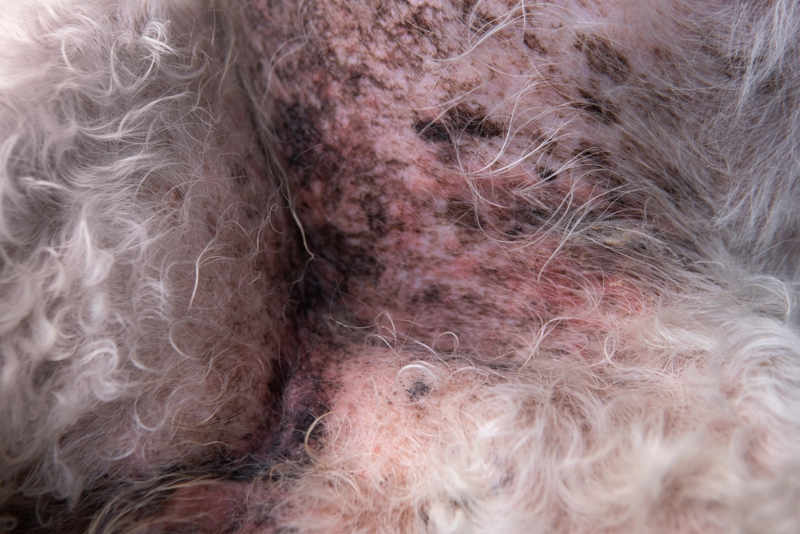
Owners can determine if their dog has an allergy by noticing patterns in their itching and keeping ‘reaction diaries’. Allergies are incredibly common and typically present between 1 and 5 years of age in dogs who spend a lot of time inside and who are purebred (pedigree).
While allergies cannot be cured, they can be well managed by avoiding the allergen and treating flare ups with medication and washes as needed. In some instances, it is worth investing in allergy tests and trialling immunotherapy, to try and desensitize the dog to what they’re reacting to.
Learn more about Skin Allergy Issues.
2. Flea dirt
Fleas are incredibly common and they will often cause itching over the rump and tail. While we may not see the fleas themselves, we can see the dark grit that they leave behind (flea dirt). These small black spots of grit can be seen more easily on lighter-furred dogs and should be detected if you comb a flea or nit comb through the dog’s fur.
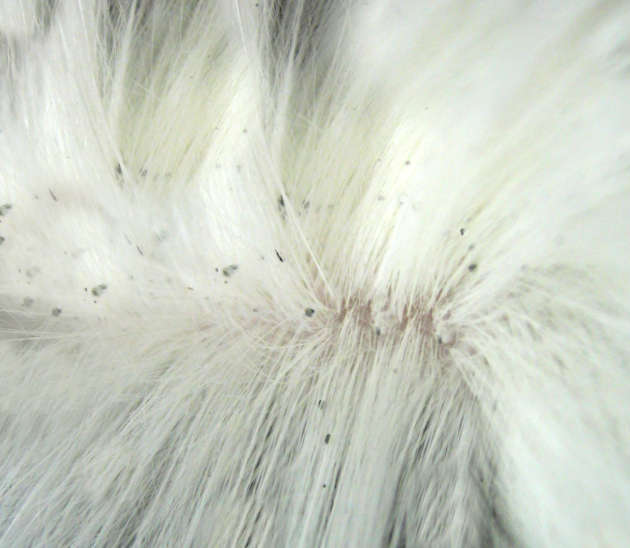
We can usually treat a flea infestation from home by using an effective flea treatment that has been prescribed by the vet. All cats and dogs in the home need to be treated. As 95% of the flea burden lives off the pet and in the home, we do also need to deep clean the home and to use a flea spray to eliminate the eggs and larvae. Learn more.
“If your dog’s skin becomes broken or infected from all of the scratching they’re doing, a vet visit is in order so that they can be issued some antibiotics and medicine such as steroids to calm the itch.”
3. Yeast infections
When a dog develops a yeast infection their skin can turn a grey or black color and they can develop dark spots. You might also notice a ‘musky’ smell and affected pets tend to be a bit itchy.
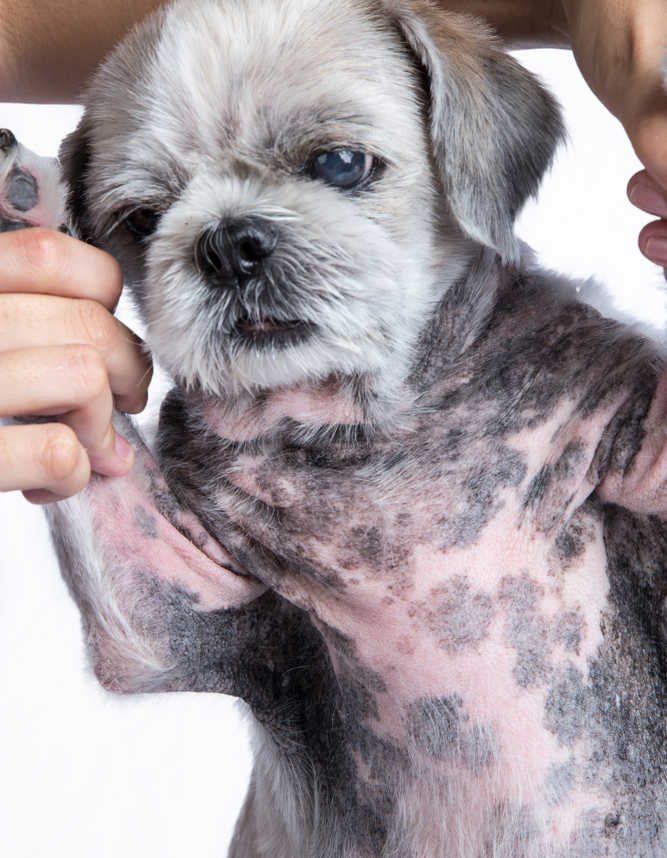
For most, yeast infections are associated with ongoing allergic skin disease. However, there can be other causes including hormonal disorders. The key is in determining the trigger and addressing this. Oral anti fungals are generally not required, but your dog will be issued with a medicated wash to target the overgrowth of yeast.
Learn more about Black Spots Due to Yeast Infections (with pictures and vet advice).
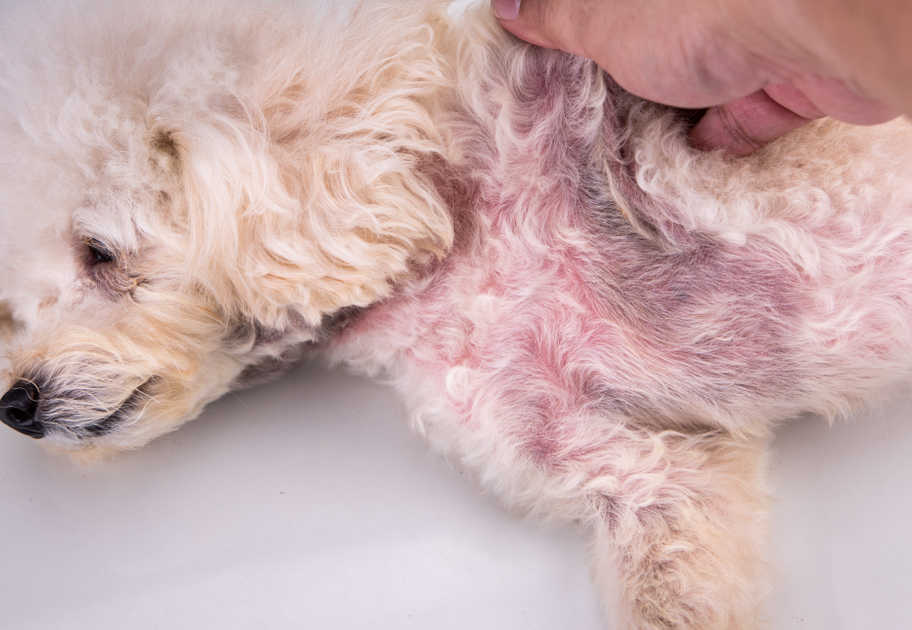
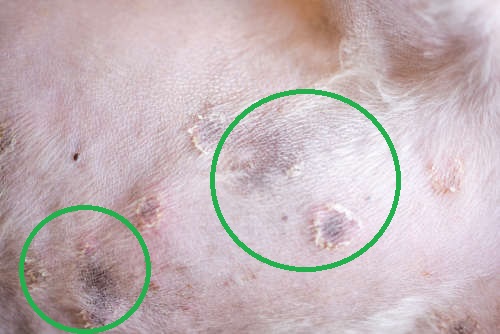
4. Hormonal discoloration and secondary infections
Two of the most common hormonal disorders we see in our canine companions are Cushing’s disease and Hypothyroidism. Both of these conditions can cause skin changes and secondary bacterial or yeast infections.
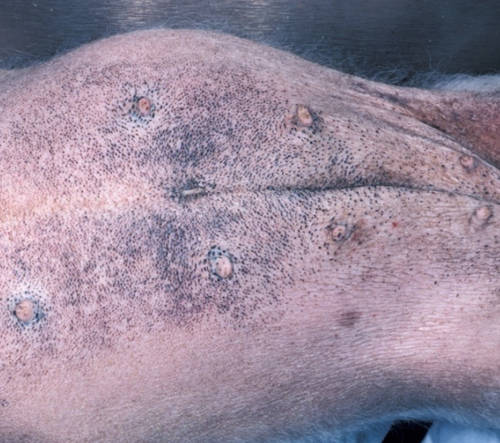
The dog in this photo has ‘calcinosis cutis’ due to undiagnosed Cushing’s disease.
These lesions can be quite itchy and the surrounding skin is often darkened. Affected dogs will also be displaying the typical signs of Cushing’s including:
- excess thirst,
- panting and a
- bloated belly.
Thankfully, Cushing’s disease can be treated with daily medication. As well as managing the endocrine disorder, any secondary skin infection will also need to be addressed separately.
View Pictures of Cushing’s disease.
5. Mange
The dog in the picture below has mange. They have extensive fur loss, as well as areas of red and black skin. They will be intensely itchy. The first areas affected tend to be the ear flaps, elbows and belly, but after a while, the mites can be anywhere.

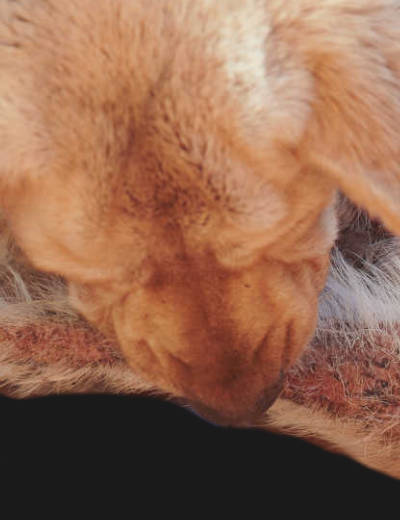
Mange is highly contagious, so is more common among stray dogs and those who live with a lot of other dogs. It can be treated with a prescription anti-parasite product, and sometimes those more severely infected will need regular insecticide dip treatment too. As mange causes such severe itching and skin disease, owners should seek veterinary care ASAP.
Learn more about Mange (Pictures, Symptoms, Treatments).
Leaving skin disease untreated gives it time to spread and worsen.
The longer it is present, the more risk of secondary infections and of infections going deep into the skin. It is also very unpleasant for your dog to feel itchy, and the sooner we can get the itch under control, the better.
If your dog has itchy black spots, your first step is to get a diagnosis at the vet
The first step to determining the right treatment in getting a diagnosis, and this should be established by a veterinarian who has seen your dog and their skin. In some cases, tests such as skin scrapes and swabs will be required before a diagnosis can be reached.
Best OTC products to Help
There are some products which may help dogs with itchy black spots, and be sure to double check with your vet first to ensure that they’d be appropriate for your pet.
1. Douxy Pyo mousse
This is a product I use frequently with my patients as it is very effective and well tolerated. Not only does it disinfect the surface of the skin, it is also hydrating, so prevents the skin from drying out and becoming flaky and uncomfortable.
- #1 non-prescription topical brand used and recommended by U.S. veterinarians for dogs and cats with infections/inflammatory dermatological disease
This product is particularly good for mild and superficial bacterial and yeast infections. This study demonstrated how this product can be effective in the management of atopic dermatitis and reduces the need for oral antibiotics.
2. Mal-a-ket shampoo
This shampoo is both antimicrobial and anti-fungal, which is ideal for dogs with mixed infections.
Many of the owners I work with who own dogs with chronic skin disease choose to use products like this as their ‘regular’ shampoo, to keep on top of their pet’s skin complaints.
No products found.
Diagnosis at the vet
When seen by the vet in person, they will examine your pet; performing a thorough physical exam and assessing their skin. This should include a flea comb and they may also run additional tests such as a fur pluck, skin scrape and/or skin swab.
If an endocrine or underlying health issue is suspected, your vet may also advise on some blood and urine tests.
Allergy tests are another consideration, particularly when a dog is dealing with ongoing skin complaints that never fully resolve. This can mean either a blood test or skin prick tests. These tests, however, are costly. They’re also not always 100% accurate, yielding a large amount of both false positives and false negatives.
Frequently Asked Questions
Can yeast infections cause an itchy black spot on my dog?
Yeast infections initially cause the skin to go pink or red. Over time, it can then turn a gray or black color. Skin can also thicken and begin to resemble ‘elephant skin’. Learn more about black spots caused by yeast infections.
Is itching the only physical symptom for identifying a black spot?
Some black spots will cause your dog to itch. We may also be able to see and feel a thickening in the skin, or scabs in the area. For some dogs, they may also have greasy skin or fur that can be felt. With more advanced infections, there can also be a bad odor.
Related posts:
Disclaimer: This website's content is not a substitute for veterinary care. Always consult with your veterinarian for healthcare decisions. Read More.




Be the first to comment